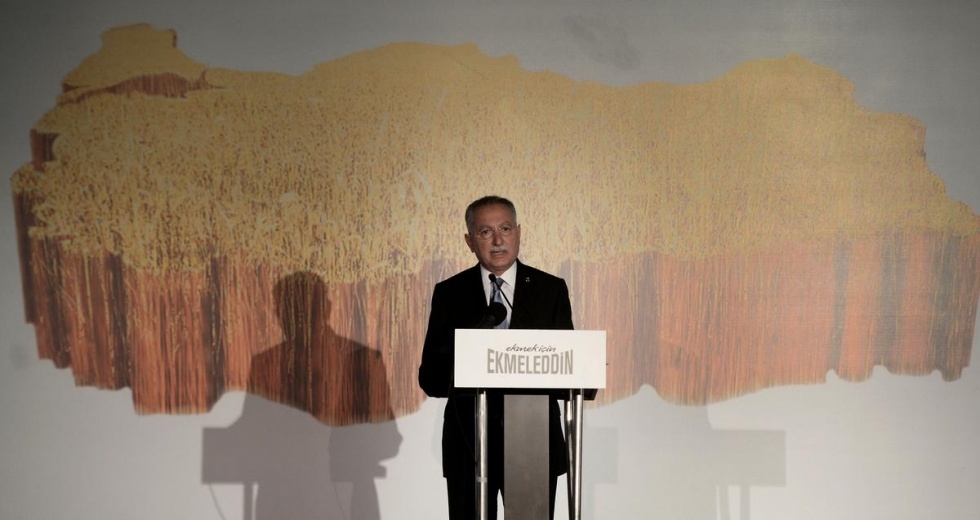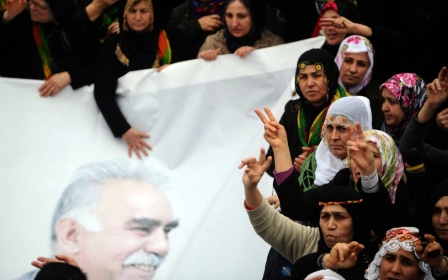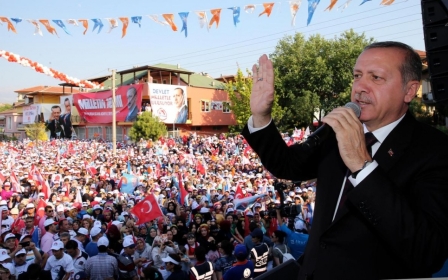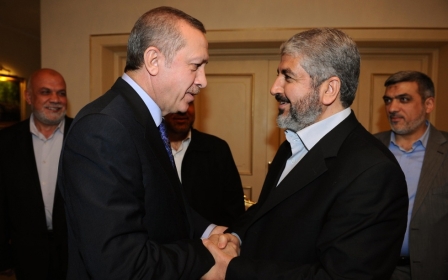Could Ihsanoglu lead a wind of change?

The candidacy of an Islamic scholar and former General Secretary of the Organization of Islamic Cooperation, who devoted his life to Islamic studies and cultural exchanges between East and West, was perhaps a surprising move of the two main opposition parties in Turkey for the upcoming presidential elections. Though it was not uncommon for many - as the self-defined centre-left and secular Republican People's Party (CHP) and Nationalist Movement Party (MHP) engaged in quasi-cooperation in March 2014 local elections for Ankara municipality, the nomination of Ekmeleddin Ihsanoglu as their "joint candidate" has taken the rapprochement of the two parties one step forward.
Arch rivals of the past, the main flag bearer of the democratic left CHP and nationalist MHP of the time engaged in fierce fights during the troubled 1970s that ended up with a military coup in 1980.
However, the talks of a possible CHP-MHP cooperation dates back to mid-2000s, when prospective coalition options to counterbalance the Justice and Development Party (AKP/AK Party) was on the table.
Former lecturer at Gazi University and current AKP MP Naci Bostanci, declared in 2007 that, "Over the past two decades, the Turkish electorate has become more moderate and tolerant toward different ideas and brands of politics. Enemies of the past are now more tolerant and respectful of each other and opposing ideas."
Indeed, it is worth noting that political stances have changed over the last few decades, as the political parties currently position themselves differently.
Risks taken
Besides being the joint candidate for CHP and MHP, which are represented in the parliament, three non-parliamentary parties, namely Democratic Left Party, Independent Turkey Party and Democratic Party have officially declared their support for Ekmeleddin Ihsanoglu. However, the voter base of the respected three non-parliamentary parties is rather limited.
In this respect, Ihsanoglu's background and opinions on some core matters that are of direct concern of CHP and MHP are playing a critical role in his pre-election campaign. Just after the announcement of Ihsanoglu's candidacy, the ultra-secular cadres of CHP declared their discomfort about him. Referring to his former General Secretary role in the Organization of Islamic Cooperation, CHP Izmir MP Birgul Ayman Guler said "the institution for which he worked is self-explanatory; he is a 'political Islamist'. Political Islamism is a political stance, and it is a manner that CHP cannot accept."
Perhaps this is something that the CHP leader Kemal Kilicdaroglu should seriously consider in the upcoming days. On one hand, there has been a wind of change within the party establishment for years and the subsequent internal policy revisions are taken to another level with the candidacy of Ihsanoglu.
On the other hand, Kilicdaroglu has the difficult task to balance out the differing political views within the party, most notably those of the ultra-secularist camp against those of the pluralist democrats. Yunus Emre at Istanbul Kultur University told MEE that Ihsanoglu's candidacy shows the signs of this rationale. It is the embodiment of the "representing all" type of approach that has been happening for the last few years. "But things do not proceed as planned in politics all the times."
"There are more serious problems than antagonizing the CHP base" he said. "[Ihsanoglu's] candidacy is the ultimate acceptance of the failure of the opposition's political stance, as well as the state that identity politics has reached in Turkey."
Taha Ozhan at Ankara based think-tank SETA Foundation does not think that Ihsanoglu can really make a difference. For him, in the upcoming presidential elections, there are three names, but only two candidates. "Ihsanoglu is just a name, a project in other words; and could not be considered as a candidate," he told MEE.
"You cannot have a candidate with a non-political background in a nationwide election. This is going to be the ninth time that CHP and MHP will lose to AK Party in an election. Knowing that, they are now flinching from politics and using Ihsanoglu as a way to bypass the elections."
On MHP side, Ihsanoglu is a candidate that the party base can easily assent compared to CHP's. His nature, views and past activities are in line with MHP's, and he shows the utmost respect to the political choices of the parties he is representing.
For Recai Coskun at Sakarya University, CHP and MHP electorate know that Ihsanoglu is not a direct candidate of their respected parties, therefore his narrative does not have to "match" with the parties' on every matter.
"He (Ihsanoglu) will obviously use a reconciliatory language, especially towards Kurds. He would be inclusionary, and will give reassurances on the basis of democracy, freedoms and the constitution," Coskun told MEE.
However, according to Mustafa Altunoglu at Anadolu University, both parties are cruising in uncharted territory. He stated that it is very difficult for Ihsanoglu to satisfy both CHP and MHP. "It is obvious that the two parties are trying to convince the conservative and Kurdish electorate. With the additional support from Gulen's Hizmet movement, there is limited outreach to conservatives," he told MEE.
"But I do not think that neither conservative, nor Kurds would massively vote for Ihsanoglu," he added. "Conservative electorate is loyal to AK Party and to Recep Tayyip Erdogan. This was proven after the last local elections."
Challenges ahead
Ihsanoglu's relative lack of political experience to other candidates is the biggest challenge that lies ahead. With his humble personality, along with his modest propaganda campaign, he is having difficulties in convincing those who aspire an action-oriented presidency. The fact that the winner of this election has supra-parties legitimacy and happens to be the result of some 20 million votes, Ihsanoglu's personal inclination to be a ceremonial president like his predecessors could be challenging.
"In a popular vote, a candidate should ask for the votes of the people," Ozhan said. "His campaign statements are absurd and almost disturbing."
Unlike Recep Tayyip Erdogan's determination to become an action oriented president, Ihsanoglu claims that it is not the president's role to be in charge of executive practices.
According to Emre, differing opinions regarding the president's role and authority is beyond debate. "In all the parliamentary systems, the roles of the presidents are clear. In fact, should he be elected, Prime Minister Erdogan also knows the limits of his authority," he said.
"He (Erdogan) is using the issues like 'action-oriented president' or 'should he resign as PM to run for presidency' to occupy the news agenda, so that the opposition cannot campaign properly."
Albeit many apparent downsides, there is a basic rationale behind the Ihsanoglu choice: he is a name who is expected to reach AKP's backyard. For Coskun, Ihsanoglu's broad domestic and international "social network" is his strongest appeal.
"Sociologically, he is a name that could not be in conflict with an average AKP voter," Coskun said. "In addition, he is someone who could mobilise the masses that are disillusioned with corruption allegations and hostile attitudes of Erdogan, but did not have any other option so far."
Real chance of winning
At this stage, it is difficult to foresee on what basis the voters will decide. For Altunoglu, no matter what Ihsanoglu's personality is like, or how of a perfect candidate he is, his chances of winning are very slim.
"Erdogan is indisputable for many, and this view is not irrational," he said, "He has an unrivalled connection with lower classes, and he is keeping their hopes high for social mobility."
To secure a win, candidates should secure more than fifty percent of the votes at any given round of the elections. That is to say, in order for Ekmeleddin Ihsanoglu to win the elections, he should acquire more votes than the traditional CHP and MHP electorate that make up to 40-45 percent.
This means that Ihsanoglu should be able to reach out to the AKP electorate, and also secure some Kurdish votes. It is very difficult to convince Kurds at this stage no matter how good intentioned Ihsanoglu is, mostly because he is a candidate of the MHP; the historical nemesis of the Kurdish political movement in Turkey.
For Coskun, a basic observation would tell that Ihsanoglu would be the third option for an average Kurdish voter. "If he leans towards the AKP and Kurdish political movement line, then an average MHP voter would ask why they should vote for him. He should strike the delicate balance."
Umit Firat, a prominent Kurdish intellectual, told MEE that if Selahattin Demirtas, the candidate of Kurdish dominated People's Democracy Party (HDP) could not reach the second round of the elections, the Kurdish electorate would be set free. "If the elections go to the second round, it is difficult to expect HDP to declare their support for a specific candidate," he said.
"Kurds have two options in the second round: they either would not go to the polls or vote for Erdogan."
For Ozhan, the chances of CHP and MHP in winning the Kurds is out of question. "CHP is a party that is stuck in two geographical regions of Turkey and MHP cannot show a presence in more than one region," he told MEE.
"For a matter like the presidential elections, which concerns the nation as a whole, they (CHP and MHP) do not have a presence; and with their candidate, they are increasingly rendering themselves from politics."
Altunoglu does not expect a surprise win for Ihsanoglu. "CHP base would reluctantly support him, while some nationalists, social democrats and socialists would go for Demirtas," he said. "I would even expect some votes for Erdogan."
For Ozhan, from a macro perspective, the state of both parties raises existential questions. "No matter what the outcome will be, one thing is obvious: as long as both parties (CHP and MHP) do not face Kemalism, they are bound to lose," he said.
"They represent the 20th century, and they have no place in this century. They will either transform themselves or will vanish in time; leading the way for newcomers. This is what happened with the AK Party after its founders broke their ties with the Welfare Party in the early 2000s, and the same applies to CHP and MHP. The republican era is full of similar examples
New MEE newsletter: Jerusalem Dispatch
Sign up to get the latest insights and analysis on Israel-Palestine, alongside Turkey Unpacked and other MEE newsletters
Middle East Eye delivers independent and unrivalled coverage and analysis of the Middle East, North Africa and beyond. To learn more about republishing this content and the associated fees, please fill out this form. More about MEE can be found here.




